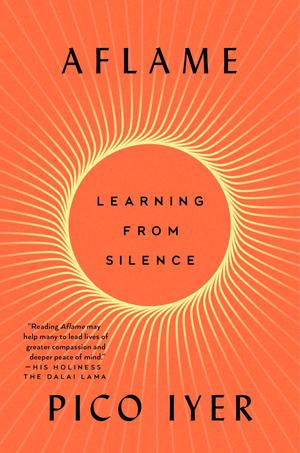Aflame : learning from silence

It’s only by being alone that you realise that you’re never alone.
I love all of Pico Iyer’s books. His writing is like poetry. These are a few beautiful sentences I liked.
His most recent books to me tackle the question how to live with ‘joyful participation in a world of sorrow’.
“I wonder if beauty always has to carry a trace of mortality” I try, and my two friends are wise enough not to say a word, looking out over the charred hills to the promise all around
Sound, now and then, of surf, sidling in and receding among the rocks below. Flows the colour of blueberry icecream along the way. Such a simple revolution: Yesterday I thought myself at the centre of the world. Now the world seems to sit at the centre of me
She smiles in recognition. The point of being here is not to get anything done; only to see what might be worth doing
And contemplation, I come to see, does not in any case mean closing your eyes so much as opening them, to the glory of everything around you. Coming to your senses, by getting out of your head
How to put words to it? As easy to catch sunlight inside a jar
My house burned down, I can now see better, the rising moon (Masahide)
Anyone can sit in a Zendo, a monk down the road as written. The trick is to sit in the world
He clings “like a miser to the freedom that disappears as soon as there is an excess of things”
Now I’ve been coming back for eighteen years. ‘You’re a Catholic?", “I wasn’t then. Now-” Ree pauses - “Now I’m a Roman Catholic Buddhist. But I’m beginning to think that’s not broad enough’”
AS SOON AS I’M SAFELY in my cell, I’m an impulsive child again, stepping out into the starlit quiet and spinning myself round till I feel dizzy. Nothing feels forbidden here because there’s no one I’m supposed to be. Then I walk up towards the chapel, following the small beam of my flashlight, and shiver as I see a dark figure, approaching from the other side: myself, I realize, reflected in the flashlight’s glow. Inside, the place is shriven, chaste; on the floor, I spot a tiny scrap of paper. I bend down and make out words scribbled in a very small hand: “I wish to know and be kinder.”
“HOW ARE YOU TODAY, PICO?” the prior had asked me at lunch. “Well. Too well.” “Don’t worry,” he said, smiling broadly. “We can fix that.”
SOMETIMES I WONDER—and friends keep asking—how spending all this time in silence has changed me. I can hardly count the ways, now that joy seems the opposite of pleasure and freedom arises out of an embrace of limits; it’s impossible to take so seriously the self that huffs and puffs along the highway. When I find myself in a crowded airport terminal, I’m drawn, as if magnetically now, to a quiet corner in the sun; as I wait for Hiroko to come back from work—will it be twenty minutes or ninety?—I turn off the lights and listen to Bach. Some nights, of course, I still wake up in the dark, unable to sleep. I worry about that cough nearby, fear for Hiroko if I should go before she does. Chaos and suffering seem endless. Then I recall the sun burning on the water far below and feel part of something larger in which nothing is absolute or final.
Almost as soon as I enter his simple room, he asks me, as on every visit, whether I’m married. I am, I say, as always, and he shakes his head. “That’s the real training. Sitting on top of a mountain in a meditation hall is easy by comparison.”
I spend time with monks and nuns, I realise, because they’re giving themselves full-time to the essential practices: learning how to love in the midst of loss. And how to hope in the face of death.
At night, sitting alone in our small apartment in the dark, waiting for Hiroko to come back from work, I turn more often to Leonard Cohen. His dense, unsparing songs refuse to believe that the world is soluble or any transport permanent; they push, unflinchingly, into bafflement and betrayal, even sin, the order of punishment he never shies away from. Here, I think, is Buddhist practice: simply, systematically picking apart every inconstancy to remind us that we cannot count on anything other than a mind that is prepared to live calmly with all that it cannot control.
“You can’t dwell on things,” Fu agrees. “That’s the heart of Zen practice. Not dwelling.” She cites a line from the thirteenth-century teacher Dogen: all he knows is the sound of black rain on the tiles of the roof. “And even that doesn’t last,” I say.
“Do you have a definition of God?” the host suddenly inquires. “Reality,” I say, not thinking.
Every kind of certainty is dissolved.